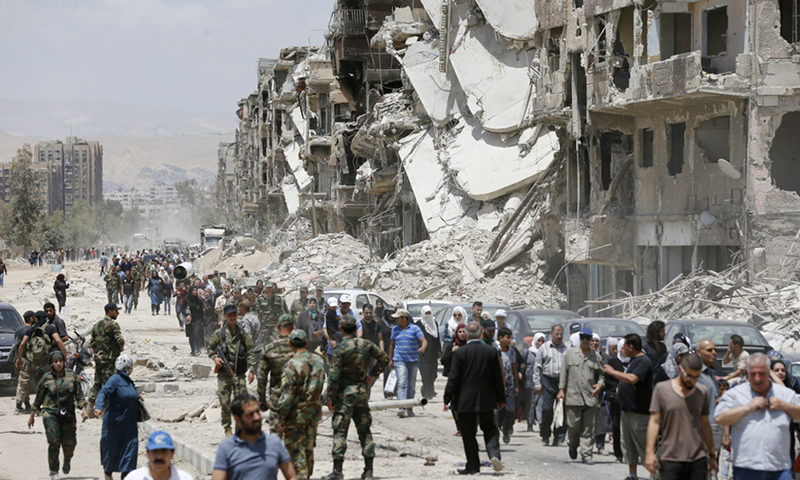The Directorate of Organization and Urban Planning in Damascus confirmed that thousands of objections were received regarding the Yarmouk camp’s regulatory plan in the Syrian capital, Damascus.
According to what was published by the government newspaper, “al-Baath” on 14 September, the director of the Organization and Urban Planning Directorate of Damascus, Ibrahim Diab, said that “the Yarmouk camp’s regulatory map received about 2,800 objections.”
The newspaper also mentioned that Diab pointed out that the Syrian Prime Ministry sent the directorate a letter of agreement regarding its decision to hold off the study procedures and approval of the Yarmouk camp’s new regulatory map.
Diab said that the Yarmouk area is still under study and discussion with the relevant authorities, thus “contributing to the residents’ return to their houses.”
Regarding the Barzeh area, Diab expected that the study areas there would be determined after presenting the study to the executive bureau within the plan of this year’s ending and the beginning of the next year.
Diab declared that the procedures for certifying regulatory maps would be announced after presenting them to the Damascus City Council.
He indicated that the one-month announcement period is to receive objections to the regulatory maps, which will be referred to the regional committee to study them and follow up on the ratification procedures by Syria’s Ministry of Public Works and Housing.
Diab noted that reconstruction is applied before implementing the master plans to remove the rubble under the reconstruction law, which does not contradict the urban planning laws.
Previously, the “Action Group for the Palestinians of Syria (AGPS)” said that Damascus governor, Adel al-Olabi, had a meeting with the legal and technical committee designated to study the Yarmouk camp’s regulatory plan, following the governorate’s decision to hold off the implementation of the plan, after thousands of objections from the residents of the camp.
This comes within the continuation of the Yarmouk camp residents’ demands to return to their real properties and end their living and economic sufferings.
Damascus governorate decided to hold off the issuance of the Yarmouk camp’s final regulatory plan and formed a committee in this regard after thousands of objections were submitted by the camp residents.
According to a decision issued by the governorate last August, Damascus governor, Adel al-Olabi, ordered the formation of a committee, headed by himself and two governorate directors, and the head of the Yarmouk camp’s services department, Rula Mawed.
This committee aimed at studying the issue of the Yarmouk camp after issuing the suspension decision of its regulatory plan. It was also designed to discuss the future solutions for the area.
Last June, Damascus governorate announced its approval of the al-Qaboun area’s regulatory plan and the Yarmouk camp’s regulatory map in Damascus.
Nevertheless, the Yarmouk camp’s master plan was rejected by the Palestinians of Syria, amid calls from Palestinian human rights organizations for the Damascus governorate to retract the plan, as it is seen as a complete change for the camp’s features.
Palestinian lawyer, Nour Eddin Salman, who lives in Damascus, published on his “Facebook” page that the number of objections submitted by the camp’s residents on the plan has reached more than ten thousand objections.
The camp experienced battles between the factions of the former “Free Syrian Army (FSA)” and the Syrian regime forces, amid the division of the Palestinian factions between the two sides before the so-called Islamic State (IS) took control of two-thirds of the camp in 2015.
However, in May 2018, after a month-long military operation, during which the IS group was expelled from the camp, the forces of the regime completely re-established control over al-Hajar al-Aswad and the Yarmouk camp, in the wake of an unofficial evacuation agreement that transferred the IS group’s members to the desert of As-Suwayda.
The military clashes destroyed more than 60 percent of the buildings and infrastructure in the Yarmouk camp, which was classified as the seventh most destroyed area in Syria.











